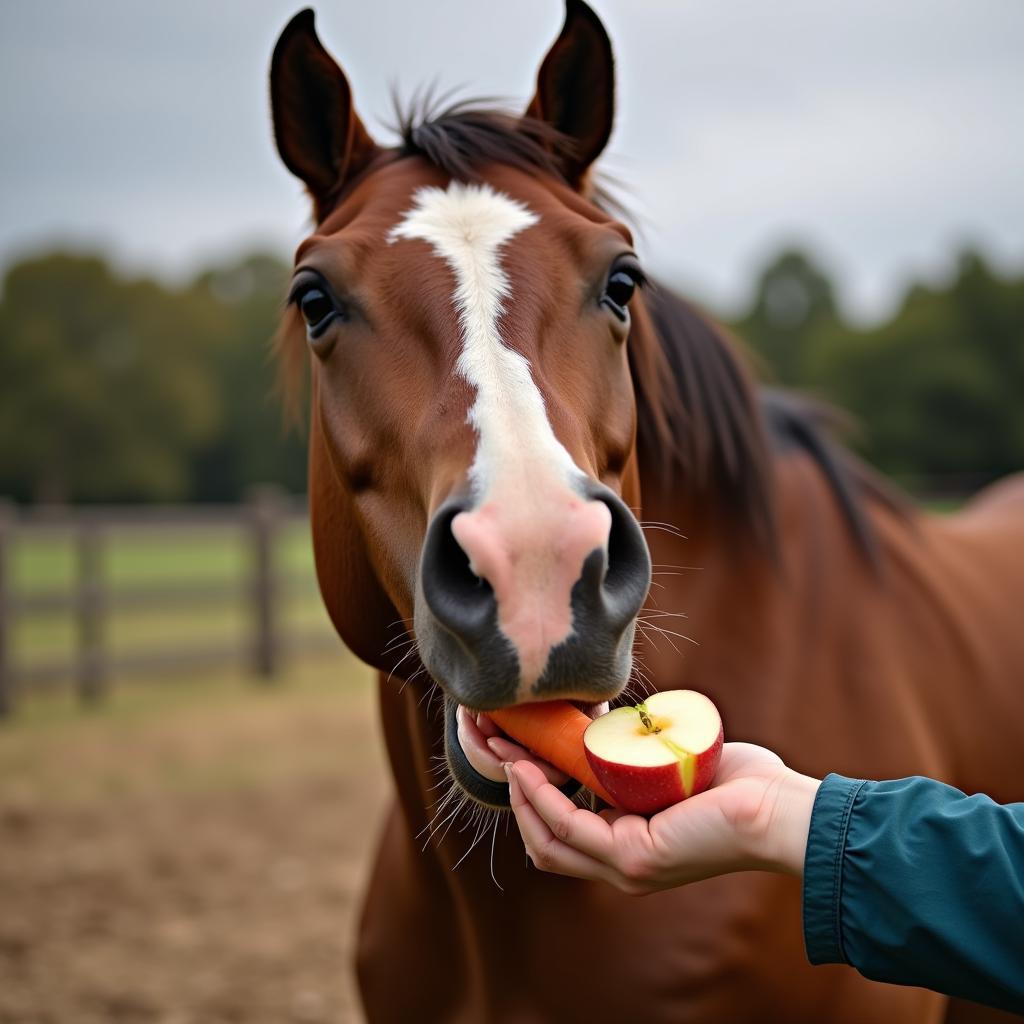Horses are magnificent creatures with unique dietary needs. Knowing What Can Horses Eat From Human Food is crucial for their well-being. This article will explore safe and unsafe human foods for horses, helping you understand how to supplement their diet without causing harm.
Safe Human Foods for Your Horse
While horses primarily thrive on hay, grains, and pasture, certain human foods can be offered as occasional treats or supplements. It’s vital, however, to introduce these foods gradually and in moderation to avoid digestive upset.  Horse enjoying carrots and apples
Horse enjoying carrots and apples
- Carrots and Apples: These crunchy delights are rich in vitamins and minerals. They can be offered in small pieces, making for a healthy and enjoyable snack.
- Bananas: A good source of potassium, bananas can be a welcome treat, especially for horses with electrolyte imbalances. However, limit the quantity due to their sugar content.
- Watermelon (rind included): This hydrating summer treat can help cool down your horse on hot days. Ensure the rind is free of pesticides and seeds.
- Berries (strawberries, blueberries, raspberries): Packed with antioxidants, these small fruits can be a delightful addition to your horse’s diet, but always in small quantities.
what human food can horses eat
Foods to Avoid Feeding Your Horse
Certain human foods are toxic to horses and should be strictly avoided. These can cause a range of health problems, from mild digestive discomfort to severe illness and even death. Understanding these dietary restrictions is essential for responsible horse ownership.
- Chocolate: The caffeine and theobromine in chocolate are highly toxic to horses and can cause serious heart problems.
- Avocado: This fruit contains persin, which can be fatal to horses, leading to colic, respiratory distress, and heart failure.
- Onions and Garlic: These members of the allium family can damage red blood cells in horses, resulting in anemia.
- Bread and Baked Goods: While seemingly harmless, these can cause blockages in the digestive system and lead to colic.
- Caffeine: Any foods or drinks containing caffeine, like coffee, tea, and energy drinks, should be kept far away from horses.
What Can Horses Eat from Human Food: A Veterinarian’s Perspective
Dr. Emily Carter, DVM, Equine Specialist, emphasizes, “While some human foods can be a healthy addition to a horse’s diet, moderation is key. Always introduce new foods slowly and observe your horse for any adverse reactions. If you’re unsure about a particular food, consult with your veterinarian.”
Can Horses Eat Grapes?
Grapes are extremely toxic to horses and should never be fed to them. Even a small amount can cause severe kidney damage.
Are Potatoes Safe for Horses?
Raw potatoes are toxic to horses due to the presence of solanine. Cooked potatoes, while not toxic, offer little nutritional value and are best avoided.
Conclusion
Understanding what can horses eat from human food allows you to provide occasional treats without compromising their health. Remember to prioritize their natural diet of hay, grains, and pasture, and always consult with a veterinarian if you have any concerns about your horse’s diet. Knowing what horses can and cannot eat from our kitchens ensures their continued health and happiness.
FAQ
- Can horses eat tomatoes? While a small amount of ripe tomato is unlikely to cause harm, the green parts of the plant are toxic and should be avoided.
- Can horses eat bread? Bread can expand in the horse’s stomach and cause potentially fatal colic. It’s best to avoid feeding bread to horses.
- Can horses eat meat? Horses are herbivores and their digestive systems are not designed to process meat.
- Can horses eat carrots? Yes, carrots are a safe and healthy treat for horses in moderation.
- What fruits can horses eat? Apples, bananas, watermelon (including the rind), and berries are generally safe for horses in small quantities.
- What should I do if my horse eats something toxic? Contact your veterinarian immediately.
- Are there any human snacks horses can eat? A few human snacks, like plain rice cakes and unsalted pretzels, can be given occasionally in small amounts, but always prioritize their natural diet.
Please contact us for assistance. Phone: 0772127271, Email: [email protected]. Our address is QGM2+WX2, Vị Trung, Vị Thuỷ, Hậu Giang, Việt Nam. We have a 24/7 customer service team.